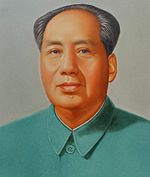- New Democracy
-
Part of the Politics series on Maoism  Basic conceptsProminent MaoistsParties by countryAfghanistan · Argentina ·
Basic conceptsProminent MaoistsParties by countryAfghanistan · Argentina ·
Bangladesh · Bolivia
Bhutan · Canada ·
Colombia · Ecuador ·
India · Iran ·
Italy · Japan ·
Nepal · Norway · Peru ·
Philippines · Portugal ·
Sri Lanka · Turkey ·
United StatesRelated topics Communism Portal
Communism Portal
Politics portalNew Democracy Simplified Chinese 新民主主义 Traditional Chinese 新民主主義 Transcriptions Mandarin - Hanyu Pinyin Xīn mínzhǔ zhǔyì New Democratic Revolution Simplified Chinese 新民主主义革命 Traditional Chinese 新民主主義革命 Transcriptions Mandarin - Hanyu Pinyin Xīn mínzhǔ zhǔyì gémìng - For different uses of the term, including political parties with the name "New Democracy", see New Democracy (disambiguation).
New Democracy or the New Democratic Revolution is a Maoist concept based on Mao Zedong's "Bloc of Four Social Classes" theory during post-revolutionary China which argues that democracy in China will take a decisively distinct path from either the liberal capitalist and/or parliamentary democratic systems in the western world, or Soviet-style communism in Eastern Europe and similar states.
The New Democracy concept still aims to overthrow feudalism and/or achieve a country's national independence from colonialism, but it bypasses the rule of the capitalist class that Marx and Lenin predicted would usually follow such a struggle, claiming instead to seek to enter directly into socialism through a coalition of classes fighting the old ruling order. The coalition is subsumed under the leadership and guidance of the working class and its communist party, working with the communists irrespective of their competing ideologies, in order to achieve the more immediate goal of a "new democratic order" that the Chinese communists of course hoped would then lead to full-blown socialism and communism, in spite of the competing class interests of the social classes of the "bloc".
The bloc of classes reflecting the principles of New Democracy is symbolized most readily by the stars on the Flag of China, with the largest star to symbolize the Communist Party of China's leadership and the surrounding four smaller stars symbolizing the Bloc of Four Classes: proletarian workers, peasants, the petty bourgeoisie (small business owners), and the nationally-based capitalists. This is the coalition of classes for Mao's "New Democratic Revolution" as he described it in his works. Mao's New Democracy explains the Bloc of Four Classes as an unfortunate but necessary consequence of imperialism as described by Lenin.
The classical Marxist understanding of the stages of economic and historical development of the modes of production under which a socialist revolution can take place is that the socialist revolution occurs only after the capitalist bourgeois-democratic revolution happens first. According to this, the bourgeois-democratic revolution paves the way for the industrial proletarian class to emerge as the majority class in society, after which it then overthrows capitalism and begins constructing socialism. Mao argued that the bourgeois-democratic revolution and the socialist revolution could be combined into a single stage rather than two separate back-to-back stages. He called this stage New Democracy.
Once New Democracy has been established in the way Mao's theory outlines, the country is subsequently claimed to be ideologically socialist and working towards communism under the leadership of its leading communist party, and its people are actively involved in the construction of socialism—see the examples of the Great Leap Forward and the Great Proletarian Cultural Revolution for what Mao viewed as the participatory democracy inherent in the New Democracy concept. According to the theory, this construction continues to happen even as the country itself may maintain and further many aspects of capitalism, such as a market economy (usually called a socialist market economy), for purposes of rapid economic growth. However, it is usually these "lesser evil" aspects of New Democracy that prompts many non-Maoist communists to criticise it as precisely not the way to achieve communism.
Because of New Democracy's nature as an 'intermediate stage', it is considered a stepping-stone to socialism—an essentially two-stage theory of first New Democracy, then the dictatorship of the proletariat ("socialism"). Given that the self-proclaimed ultimate goal of socialist construction is the creation of a stateless, classless and moneyless communist society, adding the New Democratic Revolution as a prerequisite stage arguably makes the whole process of the Revolution a three-stage theory: first New Democracy, then socialism, then communism.
Currently, the Shining Path, the New People's Army of the Philippines and the Communist Party of India (Maoist) pursue similar actions pursuant to similar ideas, conducting active guerrilla warfare ("people's war") with the intent of establishing New Democracy. In 2006, the Communist Party of Nepal entered the government of Nepal using similar "New Democratic" reasoning and methods. However, it was expelled from the coalition in 2009, and its leader (who had been elected Prime Minister) was deposed, so since then the CPN(M) has oscillated between threatening to return to 'armed struggle' and leading general strikes in Nepal using its still-considerable influence in the Nepalese labour movement.
See also
Further reading
- Mao Zedong "On New Democracy" January 1940 (Selected Works) Official PRC translation.
- Stuart R. Schram, ed., Mao's road to power: revolutionary writings 1912-1949 Vol VII New Democracy, 1939-1941 (Armonk, NY: Sharpe, 2005) pp. 330-369. Translation of the full text, based on 1943 edition, with notes.
- Mao Tse-tung (2003). On New Democracy, Honolulu: University Press of The Pacific, ISBN 1410205649.
- “New Democratic Politics and New Democratic Culture (Excerpts),” in Tony Saich, Ed. The Rise to Power of the Chinese Communist Party (Armonk, New York: 1996) 912-929.
Categories:- Communism
- Economic theories
- History of the People's Republic of China
- Maoism
- Political theories
Wikimedia Foundation. 2010.
